|
|
|
Sort Order |
|
|
|
Items / Page
|
|
|
|
|
|
|
| Srl | Item |
| 1 |
ID:
130361
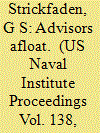

|
|
|
| 2 |
ID:
132808
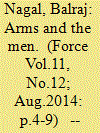

|
|
|
|
|
| Publication |
2014.
|
| Summary/Abstract |
The five pre-1998 nuclear powers have matured their Nuclear Command and Control Structures, and Nuclear Forces Structures (NFS) over a period ranging from 70 years for the US to 50 years for China.
The Cold War arms race created thousands of systems for command and control or functioning of military forces. The C4ISR systems deployed or under development provide 24 hours continuous surveillance of each other's areas/offensive weapons, detect movement of strategic systems or change of deployment patterns and allied/linked systems. The command and control of these powers are well developed, with state-of-the-art electronic systems to function under NBC conditions. The command centres are located in deep underground hardened shelters, capable of withstanding nuclear attacks, functioning 24x7.
|
|
|
|
|
|
|
|
|
|
|
|
|
|
|
|
| 3 |
ID:
156935
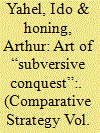

|
|
|
|
|
| Summary/Abstract |
How do states take over others' sovereign territories? This study explores in depth the techniques of a relatively unnoticed type of takeover—namely, through subversion but without formal annexation. Such takeovers are generally adopted when two conditions occur: seemingly high international costs associated with blunt/overt occupations and the victim state's territory not being ready for full-fledged annexation (for demographic reasons, etc.). To compensate for its lack of direct control over the territory in question, the dominating state must establish unique institutional and political arrangements that will allow it effective domination via remote control. Yet, these remote-control political arrangements are often fragile and get eroded over time, allowing the local populace to eventually rebel. Subversive method is nowadays becoming the preferred tool of choice for states to dominate others mainly due to the changing norms regarding military occupations/annexations.
|
|
|
|
|
|
|
|
|
|
|
|
|
|
|
|
| 4 |
ID:
122372
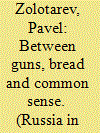

|
|
|
|
|
| Publication |
2013.
|
| Summary/Abstract |
The current trend is such that military force is gradually turning from a foreign policy tool into a military power potential. The purpose is to solve political tasks without using military force but relying entirely on the superiority in military potential.
|
|
|
|
|
|
|
|
|
|
|
|
|
|
|
|
| 5 |
ID:
122271
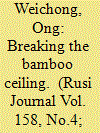

|
|
|
|
|
| Publication |
2013.
|
| Summary/Abstract |
Western intellectual traditions have exercised a strong influence on Asian military thought since the Second World War. Ong Weichong asks to what extent this is still true by comparing Singapore and the PRC, whose professional education systems, and ways of drawing lessons of war from the experiences of others, are significantly different from their Western counterparts - and from each other. He finds that, while Singapore continues to rely on Western thinking, China is developing increasingly unique interpretations of the role of its military forces and of its position within the international arena.
|
|
|
|
|
|
|
|
|
|
|
|
|
|
|
|
| 6 |
ID:
126635
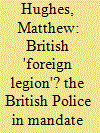

|
|
|
|
|
| Publication |
2013.
|
| Summary/Abstract |
The men of the British section of the Palestine police have romantically imagined their time as officers in Mandate Palestine, a land infused with historical and biblical significance. Many compared their service to that of the famed military force, the French Foreign Legion. This study sets the nostalgia of memory against the reality of service in Palestine, one that involved considerable brutality against local people. This essay details the empirical evidence of violence, including torture and a 'dirty war', mining archival sources, contextualizing primary source material within wider notions of British ideas of collective punishment within the empire. The Palestine police failed in its job of policing, necessitating the deployment of the army to Palestine, and with this collapse in police control the force became more violent. Ironically, the reality of life in the Palestine police was similar to that in the French Foreign Legion: a shock force there to maintain imperial control. The article argues that policing methods from the Mandate period continued after the Palestine force was disbanded in 1948, both within Israel and in other parts of the British Empire where demobilized Palestine police officers went to serve. It pushes the current paradigm on policing, extending the literature that details reforms and institutional change in the Palestine police to include the impact on local people.
|
|
|
|
|
|
|
|
|
|
|
|
|
|
|
|
| 7 |
ID:
100957


|
|
|
|
|
| Publication |
2010.
|
| Summary/Abstract |
The Cold Start doctrine is an innovative exercise. While Cold Start discusses how to start the campaign, equal thinking needs to attend how to end it. On the conventional level, the learning is that the Cold Start offensives of the integrated battle groups need to be delinked from those of the strike corps. Plausible political aims cannot be visualised that make nuclear risk of launch of strike corps offensives worth running. On the nuclear front, fallout of the scenario considered is on the doctrine of 'massive' nuclear retaliation. This has its limitations in reacting to nuclear strikes of low opprobrium quotient. Moving to 'flexible' nuclear retaliation countenancing ending an exchange at the lowest possible level may be preferable instead. In the nuclear age, utility of military force has reached its limits. The future lies in energising non-military problem solving approaches.
|
|
|
|
|
|
|
|
|
|
|
|
|
|
|
|
| 8 |
ID:
104742
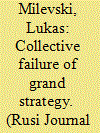

|
|
|
|
|
| Publication |
2011.
|
| Summary/Abstract |
Confusing battle for war and tactics for strategy, the West has found itself unable to counter the 'cumulative strategy' of its opponents. In the winning entry to the 2010 Trench Gascoigne Essay Prize, Lukas Milevski argues that the use of military force must be confined to Schelling's triad of taking, protecting and hurting.
|
|
|
|
|
|
|
|
|
|
|
|
|
|
|
|
| 9 |
ID:
155735
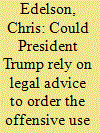

|
|
|
|
|
| Summary/Abstract |
Although the US Constitution permits presidents to order the use of military force without congressional approval only in an emergency context, presidents since Truman—especially after 9/11—have unilaterally ordered the offensive use of military force without congressional approval. Unless Congress asserts its constitutional role, President Donald Trump could continue to draw on this precedent to claim broad discretion to order the use of military force.
|
|
|
|
|
|
|
|
|
|
|
|
|
|
|
|
| 10 |
ID:
104041
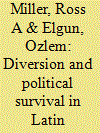

|
|
|
|
|
| Publication |
2011.
|
| Summary/Abstract |
In spite of its long history among scholars of international conflict, empirical evaluations of diversionary theory have produced contrasting-even contradictory- results. We offer three reasons for these differences: choice of unit of analysis; failure to model the reciprocal relationship between threats to the survival of political leaders on one hand, and international conflict participation on the other; and measurement error in operationalizations of the independent variable-the incentive of leaders to divert. We construct an empirical test that addresses all of these concerns. Our analysis of data from Latin America during the period 1960-99 reveals robust evidence in support of diversionary theory. The results also expose the biasing effects associated with the failure to control for reciprocal causation and measurement problems.
|
|
|
|
|
|
|
|
|
|
|
|
|
|
|
|
| 11 |
ID:
102544
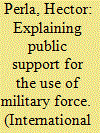

|
|
|
|
|
| Publication |
2011.
|
| Summary/Abstract |
This article examines the determinants of public support for the use of military force. It puts forward a Framing Theory of Policy Objectives (FTPO), which contends that public support for military engagements depends on the public's perception of the policy's objective. However, it is difficult for the public to judge a policy's objective because they cannot directly observe a policy's true intention and influential political actors offer competing frames to define it. This framing contestation, carried out through the media, sets the public's decision-making reference point and determines whether the policy is perceived as seeking to avoid losses or to achieve gains. The FTPO predicts that support will increase when the public perceives policies as seeking to prevent losses and decrease when the public judges policies to be seeking gains. I operationalize and test the theory using content analysis of national news coverage and opinion polls of U.S. intervention in Central America during the 1980s. These framing effects are found to hold regardless of positive or negative valence of media coverage.
|
|
|
|
|
|
|
|
|
|
|
|
|
|
|
|
| 12 |
ID:
083806
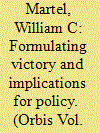

|
|
|
| 13 |
ID:
146189
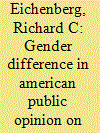

|
|
|
|
|
| Summary/Abstract |
Recent scholarship indicates that gender correlates strongly with Americans' attitudes toward the use of military force. However, most of its evidence derives from the study of major wars, and the field needs more historical research to evaluate the evolution of gender difference over time. I redress these limitations by updating and extending my earlier (2003) analysis of public support for the use of force during the 1990s. I analyze 965 individual survey questions concerning the use of US military force in twenty-four historical episodes, beginning in 1982 with military aid to El Salvador and continuing through the recent wars in Afghanistan, Iraq, Libya, and Syria. I find that substantial gender difference characterizes a large number of historical episodes and types of military action. Nonetheless, the magnitude of gender difference varies substantially; in many cases, a substantial percentage of women supports the use of force. The difference between men and women varies most with the salience and level of violence, and women are more sensitive to humanitarian concerns. Women display more sensitivity to casualties in some historical cases, but during the wars in Iraq and Afghanistan, the casualty sensitivity of men gradually increased as the wars dragged on, and gender differences therefore decreased. Thus, I argue that scholars should turn their attention to studying individual-level differences between and among men and women in support for using military force. I also discuss the political and policy implications of the findings.
|
|
|
|
|
|
|
|
|
|
|
|
|
|
|
|
| 14 |
ID:
097042
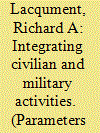

|
|
|
| 15 |
ID:
123134
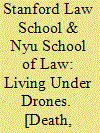

|
|
|
|
|
| Publication |
New York, Stanford Law School and Nyu School of Law, 2012.
|
| Description |
x, 165p.Hbk
|
|
|
|
|
|
|
|
|
|
|
|
Copies: C:1/I:0,R:0,Q:0
Circulation
| Accession# | Call# | Current Location | Status | Policy | Location |
| 057393 | 303.6257305491/STA 057393 | Main | On Shelf | General | |
|
|
|
|
| 16 |
ID:
126332
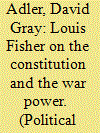

|
|
|
|
|
| Publication |
2013.
|
| Summary/Abstract |
Lou Fisher's prolific writings on the war power-the constitutional repository of authority to initiate war and lesser military hostilities on behalf of the American people-have informed and, for the better part of four decades, shaped discussions and debates on the respective roles of Congress and the president, from the halls of academe to the corridors of power. Widely cited and invoked on hundreds of occasions by political scientists, historians, and legal academics, his work has opened doors for serious consideration of his views by representatives in all three branches of the federal government. It has, as well, established his place in the front-rank of constitutional scholars and, almost certainly, earned for his scholarship an enduring influence on discussions about the constitutional authority to order the use of military force.
|
|
|
|
|
|
|
|
|
|
|
|
|
|
|
|
| 17 |
ID:
159616
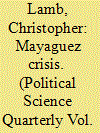

|
|
|
|
|
| Summary/Abstract |
CHRISTOPHER LAMB evaluates scholarship on the 1975 Mayaguez crisis when the United States responded with military force to a Cambodian seizure of an American merchant ship. He argues that past scholarship has generated poor explanations of the U.S. reaction. According to the author, in responding to the crisis, the United States was focused on reinforcing credibility and, more importantly, on deterring North Korea.
|
|
|
|
|
|
|
|
|
|
|
|
|
|
|
|
| 18 |
ID:
181377
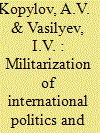

|
|
|
|
|
| Summary/Abstract |
This paper reveals the essence and content of the current militarization policy, its impact on national and international security, and suggests measures for opposing militarization in international relations and strengthening Russia's defense and mobilization security.
|
|
|
|
|
|
|
|
|
|
|
|
|
|
|
|
| 19 |
ID:
038473
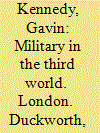

|
|
|
|
|
| Publication |
London, Duckworth, 1974.
|
| Description |
xiii, 368p.
|
| Standard Number |
0715607340
|
|
|
|
|
|
|
|
|
|
|
|
Copies: C:1/I:0,R:0,Q:0
Circulation
| Accession# | Call# | Current Location | Status | Policy | Location |
| 014065 | 322.5091716/KEN 014065 | Main | On Shelf | General | |
|
|
|
|
| 20 |
ID:
145834
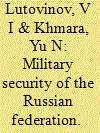

|
|
|
|
|
| Summary/Abstract |
The authors examine the conceptual foundations of military security of the state as a necessary component of its functioning. They analyze the genesis of the Russian vision of military security problems in the post-Soviet period, especially in modern conditions. They also outline methodological approaches to determining the strategy of the Russian Federation's military security in the context of changing priorities for ensuring it amid the aggravation of the military and political situation in the world and around Russia.
|
|
|
|
|
|
|
|
|
|
|
|
|
|
|
|
|
|
|
|
|